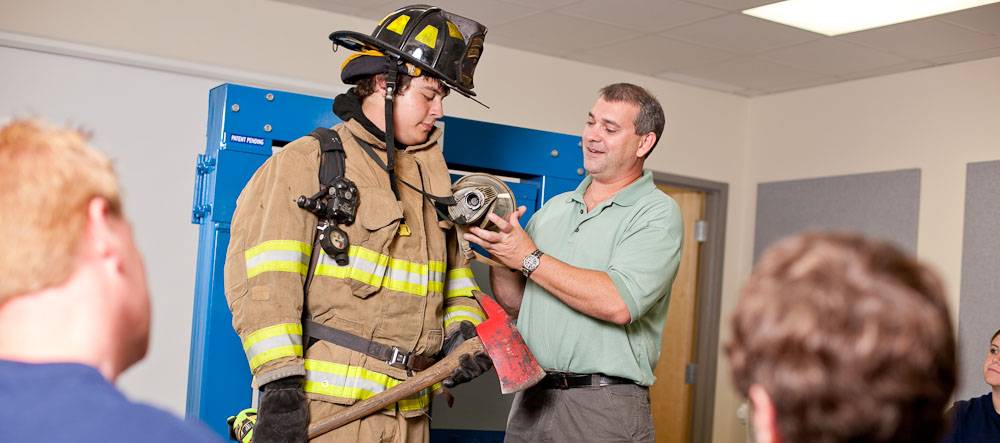Health and Public Services
FIRE PROTECTION TECHNOLOGY
ASSOCIATE IN APPLIED SCIENCE | CERTIFICATE | DIPLOMA
The Fire Protection Technology curriculum is designed to provide students with knowledge and skills in the technical, managerial, and leadership areas necessary for advancement within the fire protection community and related firefighting industries and to provide currently employed firefighters with knowledge and skills often required for promotional consideration.
Essential Functions and Technical Standards Requirements
Purpose Statement:
All students in the Fire Protection Technology (FIP) program are expected to meet certain essential functions/technical standards which are essential for successful completion of all phases of the program, and which reflect industry requirements and standards. The following technical standards represent the essential nonacademic requirements of the Fire Protection Technology Program that a student must master to successfully participate in the program and become employable. To verify the students’ ability to perform these essential functions, students may be required to demonstrate the technical standards/essential functions.
Meeting these technical standards does not guarantee employment in this field upon
graduation. Ability to meet the program’s technical standards does not guarantee a
student’s eligibility for any licensure, certification exam, or successful completion
of the program.
Technical Standards |
Definition of Standards |
Examples |
| Communication skills | Communicate effectively in both verbal and written form. |
Speak and write clearly and distinctly in interacting with team members and instructors and preparing documents and written tests.
|
| Critical Thinking | Emphasize the development of problem-solving skills, analytical reasoning, and the ability to evaluate information effectively. |
Receive, interpret, and correctly complete assignments (e.g.: reading, research, writing, and presentations).
|
| Vision | Visual ability sufficient to perform daily activities, including reading, driving, navigating spaces and engaging in visual tasks with the following components: visual acuity, color vision, depth perception, peripheral vision, visual processing. |
Discern visual information provided in the classroom and in harsh and rapidly changing
firefighting lab environments. Ability to visually inspect equipment for reliability. |
| Motor skills |
Must have manual dexterity in all limbs and the ability to reach above shoulder height and stand/walk for long periods of time
|
Ability to perform functions such as navigating field environments and maintaining balance on uneven surfaces
Ability to stoop, bend, and work in confined areas for extensive periods
|
| Auditory | Auditory skills are defined by the ability to perceive, process and interpret sounds. |
Ability to listen, understand verbal instructions, and convey information.
|
| Environmental | Ability to tolerate environmental stressors. |
Practice standard safety precautions.
|
| Emotional/Behavioral | Emotional stability is sufficient to maintain composure in stressful situations and assume responsibility/accountability for actions. |
Adapt rapidly to changing environments and/or stress.
|
| Tactile Skills | Sense of touch and feel. |
Discern various levels of heat in the surrounding environment, particularly when heat is rising to dangerous levels.
|
| Coping Skills | Ability to maintain a state of harmony. |
Solves personal and interpersonal problems.
|
Alamance Community College is committed to providing equal educational opportunities for students with documented disabilities. Students who require accessibility services or reasonable accommodations must identify themselves as having a disability and provide current diagnostic documentation to the Accessibility Services Office located in the Main Building, Room 233. All information is confidential. Please contact the Accessibility Services Coordinator for more information at 336-506-4130 or email at accessibilityservices@alamancecc.edu and notify your course instructor of your special needs, as appropriate. Students should initiate this process as soon as possible (prior to the start of classes and/or field experience).
|
Fire Protection Technology Program Estimated Costs and Fees |
|
|
Student Activity Fee |
$35.00 |
|
Curriculum Instructional Technology Fee |
$27.00 |
|
College Access, Parking & Security (CAPS) Fee |
$18.00 |
|
Student Accident Insurance |
$1.00 |
|
Books |
$500.00 |
|
|
|
|
*Does not include cost of tuition. Tuition will vary from semester to semester depending on the number of credit hours taken. |
|
|
|
|
|
Have you applied for Financial aid? Please visit Financial Aid for instructions |
|
Questions? Contact Us.
Traci Holt
Department Head
Criminal Justice Technology and Fire Protection Technology
traci.holt@alamancecc.edu
336-506-4344
Why Wait?YOU BELONG HERE |
